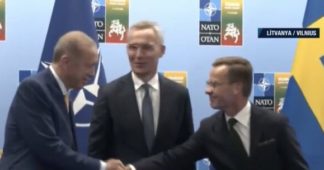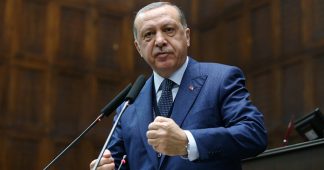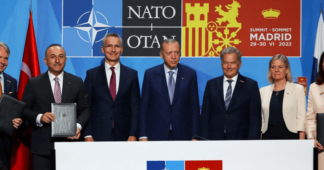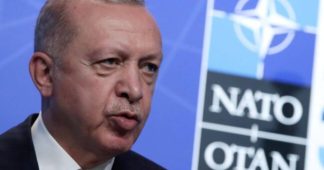Sep 2 2024
Turkey will be the first NATO member to request membership of the BRICS economic bloc spearheaded by the leaders of Russia and China, Vladimir Putin and Xi Jinping, it has been reported.
Bloomberg said Monday that Ankara had formally asked to join the group of emerging market nations as it looks beyond its traditional Western allies. Newsweek has contacted the Turkish Foreign Ministry for comment.
One former Turkish diplomat has told Newsweek that the move has been driven by “accumulated frustrations” in Ankara with the West and the European Union. “This is not the strategy, by Ankara, to replace the West, but it’s a strategy to strengthen relations with non-Western powers at a time when the U.S. hegemony is waning,” said Sinan Ülgen, head of the Istanbul-based think tank EDAM.
Named after Brazil, Russia, India and China and South Africa, the BRICS group includes countries not listed in the acronym, such as the United Arab Emirates (UAE), Ethiopia and Egypt, which all joined earlier this year. The bloc is considered to be an alternative on the global stage to the U.S.-led G7 group.
Citing unnamed sources, Bloomberg said that Turkish President Recep Tayyip Erdogan’s administration believed that “the geopolitical center of gravity” is moving away from the most developed economies.
The move also shows Ankara’s aims “to cultivate ties with all sides in a multipolar world” while still fulfilling its obligations as a key NATO member, the report added.
Bloomberg said Ankara had submitted an application months ago amid frustration at its stalled bid to join the European Union, whose membership it has sought for decades.
“One driver of this is an aspiration for enhanced strategic autonomy,” Ülgen told Newsweek. “The second driver is these accumulated frustrations with the West and the European Union,” one of which included stalled negotiations for modernizing an EU customs union deal.
“The bilateral relationship with the U.S. has also been problematic,” Ülgen said. “These type of frustrations have motivated the Turkish government to move in this direction,” he added. There is a belief in Ankara that it can do this “without a political cost that would be attached to this realignment.”
As a non-western forum in which Russian and China play a key role, Turkey’s move toward BRICS membership will be seen as a move away from the West, even though Ankara will take pains not to portray it as being detrimental to its Western ties. “The question remains whether you can actually do both at the same time,” Ülgen said.
The diplomatic push by Turkey to join BRICS comes amid rifts with other NATO members caused in part by Ankara’s close ties with Russia, despite Putin’s full-scale invasion of Ukraine. Ülgen said as there is no security component to BRICS, joining the block would not affect Turkey’s role in the alliance. “It’s mostly an economic organization so it’s likely to affect its relationship with the EU more than with NATO,” Ülgen added.
In June, Turkish Foreign Minister Hakan Fidan became the highest-level Turkish official to visit China since 2012, and he held talks with his Chinese counterpart Wang Yi, as well as other officials.
Turkish officials have attended previous BRICS summits. In June, Kremlin spokesman Dmitry Peskov said Moscow welcomed the prospect of Ankara formally joining and that its membership would be discussed at the bloc’s next summit in the Russian city of Kazan between October 22 and 24.
Putin gave a virtual address at the previous meeting in South Africa due to speculation about whether the country would be obliged to carry out a March arrest warrant issued against him from the International Criminal Court. The ICC accused him of the illegal deportation of children from Ukraine to Russia.
We remind our readers that publication of articles on our site does not mean that we agree with what is written. Our policy is to publish anything which we consider of interest, so as to assist our readers in forming their opinions. Sometimes we even publish articles with which we totally disagree, since we believe it is important for our readers to be informed on as wide a spectrum of views as possible.











